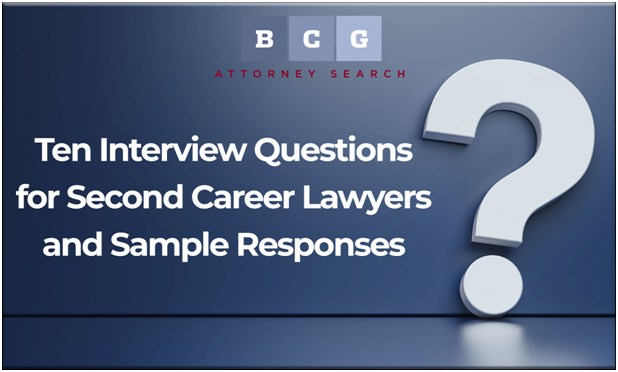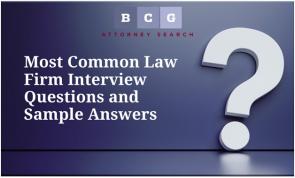
- Why did you return to school after working for a few years?
- If you’d like a broader list, see BCG’s 50 essential interview questions attorneys must master, which expands on the scenarios and answer strategies we only touched on above.
Do's: Show that you have a clear and compelling reason for returning to school to pursue a career in law. Emphasize how your previous work experience has prepared you for a career in the legal field.
Don'ts: Don't suggest that you only pursue a legal career because you couldn't succeed in your previous field. Refrain from downplaying the importance of practical work experience.
- Tell me about your background/work experience. What did you gain from it? What does your experience allow you to bring to our firm/organization?
If you’d like more nuance on structuring your opening pitch, see BCG’s How to answer “Tell me about yourself” guide for attorneys.
Do's: Show that you have a diverse background and a range of skills and experiences relevant to the legal field. Emphasize how your background and experience can benefit the firm/organization.
Don'ts: Focus less on irrelevant experience or skills. Refrain from downplaying the importance of legal knowledge and expertise.
- Of which experience are you most proud?
Do's: Show that you have the experience you are genuinely proud of and relevant to the legal field. Emphasize how your experience has prepared you for a legal career.
Don'ts: Focus less on irrelevant experiences or accomplishments. Don't suggest that you are only interested in the legal field because it is prestigious or lucrative.
- Why are you leaving the military/your business? How will you deal with a new boss?
Do's: Show that you have a clear and compelling reason for leaving the military/business to pursue a legal career. Emphasize your willingness to adapt to new leadership styles and work collaboratively with others.
Don'ts: Don't speak negatively about your previous employer or suggest that you only leave because of problems or conflicts. Don't downplay the importance of following orders and respecting authority.
- After your interview, strategic follow-up matters — for which BCG’s The art of interviewing: converting interviews into offers offers useful tactics.
- What inspired you to pursue a legal career later in life?
Do's: Show that you have a clear and compelling reason for pursuing a legal career later in life. Emphasize your life experience and skills that will enable you to make a positive impact in the legal profession.
Don'ts: Don't suggest that you are pursuing a legal career simply because you are bored or dissatisfied with your previous career. Don't downplay the importance of legal knowledge and expertise.
- Before crafting responses, it helps to ground yourself in proven interview preparation techniques, including how to research interviewers and manage stress.
- How has your previous career prepared you for a legal career?
Do's: Show that you have skills and experiences from your previous career relevant to the legal profession. Emphasize how your previous career has prepared you for a legal career.
Don'ts: Don't focus too much on irrelevant experience or skills. Don't suggest that you can succeed in the legal profession without legal knowledge and expertise.
- Even experienced professionals benefit from reminding themselves of the importance of interview preparation — no matter how confident they feel heading into a law-firm interview.
- How do you plan to balance the demands of a legal career with other obligations or interests?
Do's: Show that you have a plan for balancing the demands of a legal career with other obligations or interests. Emphasize your commitment to maintaining a healthy work-life balance.
Don'ts: Don't suggest that you are willing to sacrifice your personal life or interests for a legal career. Don't downplay the importance of work-life balance.
- For an audio deep dive, check out the Interview Workshop podcast, where Harrison discusses six universal questions and preparation strategies.
- How do you plan to continue learning and growing as a lawyer?
Do's: Show that you commit to lifelong learning and professional development. Emphasize your willingness to seek mentorship and coaching to develop your skills and expertise.
Don'ts: Don't suggest that you know everything there is to know about the law or legal practice. Don't downplay the importance of continuing education and professional development.
- How will your life experience and skills enable you to bring a unique perspective to the legal profession?
Do's: Show that you have a unique perspective and skills that will enable you to contribute to the legal profession. Emphasize how your life experience and skills will enable you to work effectively with clients and colleagues from diverse backgrounds.
Don'ts: Don't suggest that your previous career is more important than your legal career. Don't downplay the importance of legal knowledge and expertise.
- Once you advance beyond the first round, be sure to read BCG’s How Attorneys Can Excel at Second-Round Law Firm Interviews and Get More Job Offers for deeper stage-specific preparation.
- How will you approach the challenge of learning a new field of law and adapting to a new work environment?
Do's: Show your positive attitude toward learning and adapting to a new work environment. Emphasize your willingness to seek mentorship and coaching from more experienced legal professionals.
Don'ts: Don't suggest that you already know everything there is to know about the law or legal practice. Don't downplay the importance of seeking out mentorship and coaching.
- To get a sense of what interviewers expect, BCG’s Interview Tips from the Interviewers (PDF) includes candid guidance from law firm hiring managers themselves.
Conclusion
For attorneys pursuing second careers, the job interview process can be an opportunity to showcase their unique skills and experiences and their commitment to lifelong learning and professional development. By approaching the interview with a positive attitude and a growth mindset, attorneys can demonstrate their willingness to adapt to new work environments and learn new skills. As with any job interview, it is essential for attorneys to be well-prepared, professional, and respectful and to show a genuine interest in the position and the organization. With these qualities and strategies in mind, attorneys can successfully navigate the job interview process
- To complement these sample questions, you may also want to review BCG’s 23 top law firm interview tips for additional technique pointers (e.g. pacing, body language, follow-up). and take the next step in their legal careers.
About Harrison Barnes
No legal recruiter in the United States has placed more attorneys at top law firms across every practice area than Harrison Barnes. His unmatched expertise, industry connections, and proven placement strategies have made him the most influential legal career advisor for attorneys seeking success in Big Law, elite boutiques, mid-sized firms, small firms, firms in the largest and smallest markets, and in over 350 separate practice areas.
A Reach Unlike Any Other Legal Recruiter
Most legal recruiters focus only on placing attorneys in large markets or specific practice areas, but Harrison places attorneys at all levels, in all practice areas, and in all locations-from the most prestigious firms in New York, Los Angeles, and Washington, D.C., to small and mid-sized firms in rural markets. Every week, he successfully places attorneys not only in high-demand practice areas like corporate and litigation but also in niche and less commonly recruited areas such as:
- Immigration Law
- Workers Compensation
- Insurance
- Family Law
- Trust and Estate
- Municipal law
- And many more...
This breadth of placements is unheard of in the legal recruiting industry and is a testament to his extraordinary ability to connect attorneys with the right firms, regardless of market size or practice area.
Proven Success at All Levels
With over 25 years of experience, Harrison has successfully placed attorneys at over 1,000 law firms, including:
- Top Am Law 100 firms such including Sullivan and Cromwell, and almost every AmLaw 100 and AmLaw 200 law firm.
- Elite boutique firms with specialized practices
- Mid-sized firms looking to expand their practice areas
- Growing firms in small and rural markets
He has also placed hundreds of law firm partners and has worked on firm and practice area mergers, helping law firms strategically grow their teams.
Unmatched Commitment to Attorney Success - The Story of BCG Attorney Search
Harrison Barnes is not just the most effective legal recruiter in the country, he is also the founder of BCG Attorney Search, a recruiting powerhouse that has helped thousands of attorneys transform their careers. His vision for BCG goes beyond just job placement; it is built on a mission to provide attorneys with opportunities they would never have access to otherwise. Unlike traditional recruiting firms, BCG Attorney Search operates as a career partner, not just a placement service. The firm's unparalleled resources, including a team of over 150 employees, enable it to offer customized job searches, direct outreach to firms, and market intelligence that no other legal recruiting service provides. Attorneys working with Harrison and BCG gain access to hidden opportunities, real-time insights on firm hiring trends, and guidance from a team that truly understands the legal market. You can read more about how BCG Attorney Search revolutionizes legal recruiting here: The Story of BCG Attorney Search and What We Do for You.
The Most Trusted Career Advisor for Attorneys
Harrison's legal career insights are the most widely followed in the profession.
- His articles on BCG Search alone are read by over 150,000 attorneys per month, making his guidance the most sought-after in the legal field. Read his latest insights here.
- He has conducted hundreds of hours of career development webinars, available here: Harrison Barnes Webinar Replays.
- His placement success is unmatched-see examples here: Harrison Barnes' Attorney Placements.
- He has created numerous comprehensive career development courses, including BigLaw Breakthrough, designed to help attorneys land positions at elite law firms.
Submit Your Resume to Work with Harrison Barnes
If you are serious about advancing your legal career and want access to the most sought-after law firm opportunities, Harrison Barnes is the most powerful recruiter to have on your side.
Submit your resume today to start working with him: Submit Resume Here
With an unmatched track record of success, a vast team of over 150 dedicated employees, and a reach into every market and practice area, Harrison Barnes is the recruiter who makes career transformations happen and has the talent and resources behind him to make this happen.
A Relentless Commitment to Attorney Success
Unlike most recruiters who work with only a narrow subset of attorneys, Harrison Barnes works with lawyers at all stages of their careers, from junior associates to senior partners, in every practice area imaginable. His placements are not limited to only those with "elite" credentials-he has helped thousands of attorneys, including those who thought it was impossible to move firms, find their next great opportunity.
Harrison's work is backed by a team of over 150 professionals who work around the clock to uncover hidden job opportunities at law firms across the country. His team:
- Finds and creates job openings that aren't publicly listed, giving attorneys access to exclusive opportunities.
- Works closely with candidates to ensure their resumes and applications stand out.
- Provides ongoing guidance and career coaching to help attorneys navigate interviews, negotiations, and transitions successfully.
This level of dedicated support is unmatched in the legal recruiting industry.
A Legal Recruiter Who Changes Lives
Harrison believes that every attorney-no matter their background, law school, or previous experience-has the potential to find success in the right law firm environment. Many attorneys come to him feeling stuck in their careers, underpaid, or unsure of their next steps. Through his unique ability to identify the right opportunities, he helps attorneys transform their careers in ways they never thought possible.
He has worked with:
- Attorneys making below-market salaries who went on to double or triple their earnings at new firms.
- Senior attorneys who believed they were "too experienced" to make a move and found better roles with firms eager for their expertise.
- Attorneys in small or remote markets who assumed they had no options-only to be placed at strong firms they never knew existed.
- Partners looking for a better platform or more autonomy who successfully transitioned to firms where they could grow their practice.
For attorneys who think their options are limited, Harrison Barnes has proven time and time again that opportunities exist-often in places they never expected.
Submit Your Resume Today - Start Your Career Transformation
If you want to explore new career opportunities, Harrison Barnes and BCG Attorney Search are your best resources. Whether you are looking for a BigLaw position, a boutique firm, or a move to a better work environment, Harrison's expertise will help you take control of your future.
Submit Your Resume Here to get started with Harrison Barnes today.
Harrison's reach, experience, and proven results make him the best legal recruiter in the industry. Don't settle for an average recruiter-work with the one who has changed the careers of thousands of attorneys and can do the same for you.
About BCG Attorney Search
BCG Attorney Search matches attorneys and law firms with unparalleled expertise and drive, while achieving results. Known globally for its success in locating and placing attorneys in law firms of all sizes, BCG Attorney Search has placed thousands of attorneys in law firms in thousands of different law firms around the country. Unlike other legal placement firms, BCG Attorney Search brings massive resources of over 150 employees to its placement efforts locating positions and opportunities its competitors simply cannot. Every legal recruiter at BCG Attorney Search is a former successful attorney who attended a top law school, worked in top law firms and brought massive drive and commitment to their work. BCG Attorney Search legal recruiters take your legal career seriously and understand attorneys. For more information, please visit www.BCGSearch.com.
Harrison Barnes does a weekly free webinar with live Q&A for attorneys and law students each Wednesday at 10:00 am PST. You can attend anonymously and ask questions about your career, this article, or any other legal career-related topics. You can sign up for the weekly webinar here: Register on Zoom
Harrison also does a weekly free webinar with live Q&A for law firms, companies, and others who hire attorneys each Wednesday at 10:00 am PST. You can sign up for the weekly webinar here: Register on Zoom
You can browse a list of past webinars here: Webinar Replays
You can also listen to Harrison Barnes Podcasts here: Attorney Career Advice Podcasts
You can also read Harrison Barnes' articles and books here: Harrison's Perspectives
Harrison Barnes is the legal profession's mentor and may be the only person in your legal career who will tell you why you are not reaching your full potential and what you really need to do to grow as an attorney--regardless of how much it hurts. If you prefer truth to stagnation, growth to comfort, and actionable ideas instead of fluffy concepts, you and Harrison will get along just fine. If, however, you want to stay where you are, talk about your past successes, and feel comfortable, Harrison is not for you.
Truly great mentors are like parents, doctors, therapists, spiritual figures, and others because in order to help you they need to expose you to pain and expose your weaknesses. But suppose you act on the advice and pain created by a mentor. In that case, you will become better: a better attorney, better employees, a better boss, know where you are going, and appreciate where you have been--you will hopefully also become a happier and better person. As you learn from Harrison, he hopes he will become your mentor.
To read more career and life advice articles visit Harrison's personal blog.






